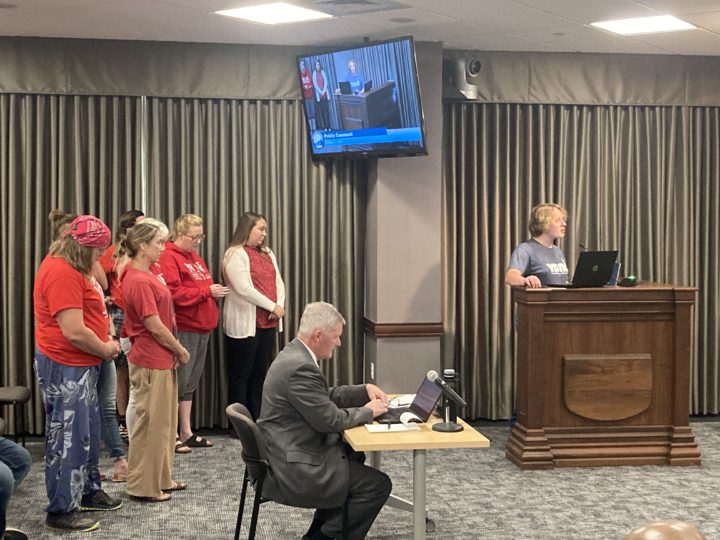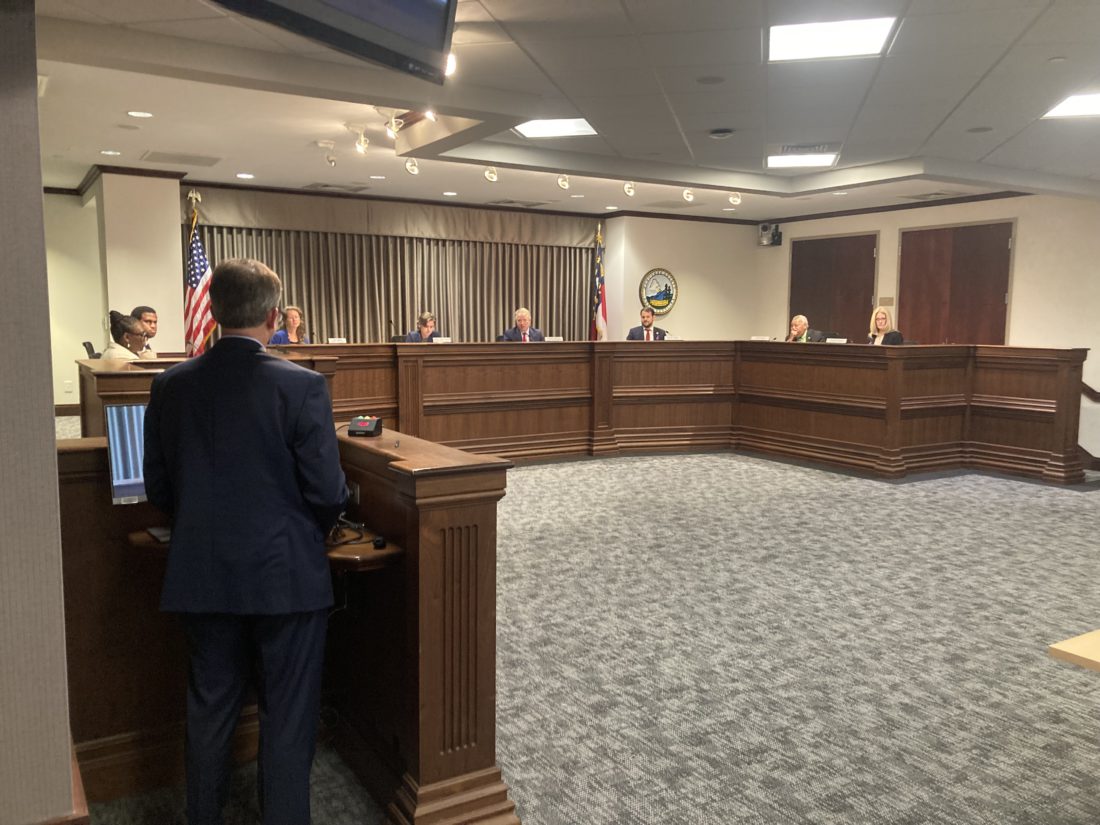Six years after the FBI launched an inquiry into former Buncombe County Manager Wanda Greene for corruption, the county Board of Commissioners has reached a final mediated settlement with the Greene family, releasing them from further litigation.
Wanda Greene, her son Michael Greene, who also worked for the county, and daughter-in-law, Celena Greene, have agreed to pay the county $502,500 by December 2025. The payments are related to the improper use of county funds to purchase sponsorship and advertising at equestrian-related venues, said Philip Anderson, an attorney representing Buncombe County in the case, at the Oct. 3 board meeting.
Wanda Greene, who was the county’s manager for 20 years before retiring in 2017 just months before the FBI launched its investigation, pleaded guilty in 2019 to two counts of federal programs fraud, one count of making and subscribing a false tax return and one count of receiving kickbacks and bribes. She was sentenced to seven years in prison but was released in January 2022. Several others, including Michael Greene, also received prison terms as a result of their participation in her various embezzling schemes.
The latest settlement, reached Sept. 22, stemmed from a federal lawsuit against former Commissioner Ellen Frost, who ultimately repaid $575,000 of county funds that she and Wanda Greene funneled into “various equestrian enterprises in North Carolina and Florida,” according to a 2019 Xpress report.
Buncombe County filed a lawsuit against Wanda Greene in July 2022 over her involvement in the improper equestrian-related payments, Anderson said, and a federal judge ordered Greene to pay more than $419,000 in September 2022.
After that order, Anderson said the legal team learned of fraudulent transfers that Greene was making to her son and daughter-in-law in an attempt to put assets beyond the reach of creditors. Instead of making payments to resolve the county’s $419,000 claim against her, Greene transferred cash and other assets to her family members, Anderson said.
The Greenes’ first payment to the county of $150,000 is due Oct. 22 with a signed guarantee to pay the remainder of the settlement, Anderson said.
“This has been a long process. You have been very diligent and very effective in helping to recoup the taxpayer funds that were lifted by the former manager and her colleagues and former Commissioner Frost,” Commission Chair Brownie Newman told Anderson during the meeting.
In an original settlement in January 2019, Greene paid $750,000 to the county for kickbacks and bribes received from a general contractor, Anderson said.
Including the latest settlement, the county has recovered just under $4 million associated with misappropriated funds during the Greene administration, including for inappropriately obtained insurance policies, Anderson said.
Current County Manager Avril Pinder, who was hired in 2019, says she continues to fight to restore Buncombe’s reputation with its residents.
“From day one of being appointed to this role, I have been focused and intentional on rebuilding the public’s trust in their county government. As public servants, we don’t take our role of stewards of taxpayer assets lightly. In Buncombe County, we strive to make decisions based on our core values and to hold ourselves accountable to those values. The Wanda Greene episode has been a blot on our reputation, but we are committed to ensuring no one can take our reputation from us again,” she told Xpress via email.
Education advocates fight for funding
Red-clad local education advocates filled commission chambers once again to plead with commissioners to send more county funds to schools as teachers deal with low pay and high costs of living.

Commissioners ultimately passed the budget amendment as planned, sending $5.1 million raised from a property tax hike passed in June, plus another $1 million in reappropriated county funds, to local school boards to apply to a 2% supplemental pay increase for teachers and staff.
Oct. 3 was the county’s first opportunity to pass a budget amendment for schools because it takes 10 days for a state budget — passed by the N.C. General Assembly Sept. 22 — to become law when it goes unsigned by the governor, said Sam Riddle, budget analyst for Buncombe County.
Advocates from the Buncombe County Association of Educators and Asheville City Association of Educators speaking during public comment said a 2% increase to supplemental pay wasn’t enough.
“We are in a funding crisis, and you have a way to help it, so you have a responsibility to act. That is why we are here. You are not at fault. But you do have the power to help. We thank you for what you’ve already decided to do back in June. But we all know it’s not enough,” said ACAE President Timothy Lloyd, who is also a custodian at Asheville Middle School.
Soren Pedersen, who spoke for a group of at least seven educators during public comment, sent commissioners a lengthy email Oct. 2, complete with his own detailed analysis of educator pay and cost of living in Buncombe County to argue for a 7% raise for teachers and staff, he said.
Ultimately, their pleas came too late. After a presentation from Riddle showed that Buncombe’s appropriations for K-12 schools have increased by almost 30% since fiscal year 2021-22, Newman said the county was doing the best it could to fund schools with little help from the state.
“We recognize that North Carolina being 46th in the country [in education funding] puts us all in a bind. It does. When I look at what the county did last year to this year, I do feel like at the local level we are on a strong track. No other county in the state has increased funding for public schools by over a quarter,” he said. “I think we are making a lot of progress.”
Development plans for county-owned Ferry Road property unveiled
The 137-acre, county-owned Ferry Road site is one step closer to being home to a 645-unit multipurpose development after the UNC School of Government’s analysis of potential site development was unveiled at the Oct. 3 meeting.
Buncombe contracted UNC’s Development Finance Initiative, which partners with local governments to attract private investment for large development projects, to conduct the analysis.
The proposed development would include 530 rental apartments, 115 homes for sale, space for providers of child care and health services, 72 acres of forest and almost 2 miles of greenways connecting to the Bent Creek trail system, according to DFI’s presentation.
More than half the housing units will be offered at less than market rate, with 55 rental units priced for those that earn less than 30% of the area median income. Rents will range from $375 to $2,500 per unit, and single-family homes for purchase will start at $195,000, according to the presentation.
The development is estimated to cost $210 million with a county investment of $34 million, said Sarah Odio, representative of the UNC School of Government. To cover the rest of the cost, the DFI and the county will seek a development partner for the project, with construction slated to begin in late 2025. County staff will hold three public meetings over the next month to explain the project and solicit feedback from neighbors.




Before you comment
The comments section is here to provide a platform for civil dialogue on the issues we face together as a local community. Xpress is committed to offering this platform for all voices, but when the tone of the discussion gets nasty or strays off topic, we believe many people choose not to participate. Xpress editors are determined to moderate comments to ensure a constructive interchange is maintained. All comments judged not to be in keeping with the spirit of civil discourse will be removed and repeat violators will be banned. See here for our terms of service. Thank you for being part of this effort to promote respectful discussion.